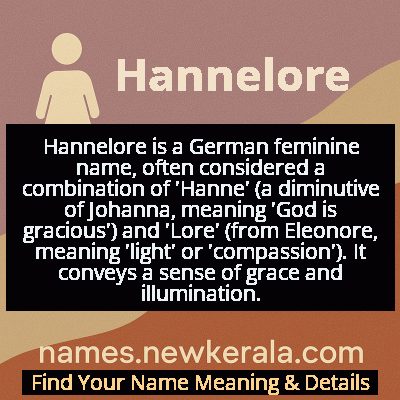Hannelore Name Meaning & Details
Origin, Popularity, Numerology Analysis & Name Meaning of Hannelore
Discover the origin, meaning, and cultural significance of the name HANNELORE. Delve into its historical roots and explore the lasting impact it has had on communities and traditions.
Name
Hannelore
Gender
Female
Origin
German
Lucky Number
2
Meaning of the Name - Hannelore
Hannelore is a German feminine name, often considered a combination of 'Hanne' (a diminutive of Johanna, meaning 'God is gracious') and 'Lore' (from Eleonore, meaning 'light' or 'compassion'). It conveys a sense of grace and illumination.
Hannelore - Complete Numerology Analysis
Your Numerology Number
Based on Pythagorean Numerology System
Ruling Planet
Moon
Positive Nature
Diplomatic, friendly, artistic, empathetic.
Negative Traits
Over-sensitive, moody, indecisive, prone to self-pity.
Lucky Colours
Green, cream, white.
Lucky Days
Monday.
Lucky Stones
Pearl, moonstone.
Harmony Numbers
1, 3, 4.
Best Suited Professions
Diplomats, mediators, caregivers, artists.
What People Like About You
Cooperative spirit, friendliness, artistic talent.
Famous People Named Hannelore
Hannelore Kohl
Philanthropist
Founded Hannelore Kohl Foundation for brain injury research and established multiple charitable organizations
Hannelore Elsner
Actress
Won multiple German film awards including the German Film Award and Bavarian Film Award for lifetime achievement
Hannelore Kraft
Politician
Served as the first female Minister-President of North Rhine-Westphalia and Vice President of the German Bundesrat
Hannelore Cay von Brockdorff
Resistance Fighter
Member of the Red Orchestra resistance group against Nazi Germany, executed for anti-Nazi activities
Name Variations & International Equivalents
Click on blue names to explore their detailed meanings. Gray names with will be available soon.
Cultural & Historical Significance
Extended Personality Analysis
The name Hannelore evokes a personality profile of grounded strength and reliable competence. Women with this name are often perceived as the backbone of their families and communities—practical, organized, and possessing deep emotional resilience. The combination of 'Hanna's' gentle grace with 'Lore's' steadfast determination creates a balanced character capable of both nurturing compassion and firm leadership. Hannelores typically demonstrate exceptional loyalty and commitment to their responsibilities, whether in professional settings or personal relationships. They tend to be traditional in their values but pragmatic in their approach to modern challenges. Many exhibit a quiet confidence that comes from life experience rather than arrogance, making them trusted advisors and natural problem-solvers. Their strength often manifests as emotional stability during crises and the ability to maintain perspective during difficult times. The name suggests someone who values authenticity over appearance, substance over style, and lasting relationships over temporary connections. This personality profile reflects the historical context in which the name became popular—women who had to be both compassionate caregivers and resilient survivors during Germany's reconstruction era.
Modern Usage & Popularity
In the 21st century, Hannelore has transitioned from a popular contemporary name to a classic vintage choice with generational specificity. While rarely given to newborns today (appearing outside the top 1000 names in Germany since the 1990s), it maintains cultural recognition and respect. The name currently experiences occasional use as a middle name or as part of the growing trend toward 'Oma-names' (grandmother names) that younger parents are rediscovering. Modern usage often involves affectionate shortenings like 'Hanni,' 'Lore,' or 'Lori' for daily use, while the full name carries formal weight. Demographic data shows Hannelore is most prevalent among women aged 70-90, creating a strong association with post-war generations. In Austria and German-speaking regions of Switzerland, the name follows similar patterns but with slightly higher retention in rural areas. The name's decline reflects broader shifts toward international and simplified names, but its distinctive German character ensures it remains meaningful within families seeking to honor previous generations. Current naming databases indicate approximately 1 in 5,000 newborn girls in Germany receive this name, primarily in families with strong regional traditions or multi-generational naming patterns.
Symbolic & Spiritual Meanings
Hannelore carries rich symbolic meaning derived from its dual components and historical context. The 'Hanna' element connects to the biblical Hannah's story of faithful prayer rewarded with motherhood, symbolizing hope, devotion, and the fulfillment of heartfelt desires. The 'Lore' component, derived from Eleonore and ultimately from the Greek 'eleos' (compassion) and connected to laurel symbolism, represents victory, honor, and eternal life. Combined, these elements create a powerful symbolism of triumphant grace—suggesting that true victory comes through compassion and spiritual strength rather than mere force. The laurel tree's evergreen nature adds symbolism of endurance and renewal, while its association with poetic and athletic achievement in classical times connects to intellectual and creative accomplishment. Historically, the name has also come to symbolize German post-war resilience—the ability to rebuild and flourish after devastation. In metaphorical terms, Hannelore represents the idea that the most meaningful victories are those achieved with integrity and humanity intact. The name embodies the concept that grace under pressure leads to lasting success, and that traditional values can guide modern achievement.

